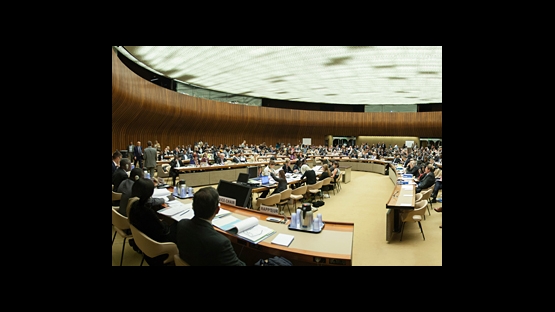IAEA representatives participated in the Sixty-Sixth World Health Assembly (WHA) at the World Health Organization (WHO) in Geneva to promote international efforts to address the growing challenge of non-communicable diseases (NCDs). During their consultations at the WHA, the IAEA delegation highlighted the role of nuclear and radiation techniques used to prevent, diagnose and treat NCDs, particularly cancer.
Employing nuclear techniques in the fight against NCDs has long been a focus of the IAEA's work in human health. WHO and IAEA established a Joint Programme on Cancer Control in 2009, and both organizations have been closely collaborating with the International Agency for Research on Cancer, as well as UN agencies as part of a task force created following the 2011 Political Declaration of the High-level Meeting of the UN General Assembly on the Prevention and Control of NCDs.
"The IAEA, as part of its mandate to promote the peaceful uses of nuclear technology, has more than 50 years of field experience in supporting its Member States to develop national capacity in the use of radiation medicine to diagnose and treat diseases, in particular cancer and other NCDs," said Rolando Camacho, Head of the IAEA's Programme of Action for Cancer Therapy (PACT). "Placing NCDs and cancer high on the development agenda is critical to drive the policy and resources needed for balanced investments in cancer control."
The IAEA delegation to the WHA is composed of Rolando Camacho, Head of the Programme of Action for Cancer Therapy (PACT); and Najat Mokhtar, Head of the Nutritional and Health-related Environmental Studies Section.
"The IAEA encourages the use of stable isotope techniques to develop and evaluate interventions to combat malnutrition in all its forms, particularly in early life," said Ms. Mokhtar prior to the Assembly. "The IAEA's work in nutrition complements the work of UN agencies, NGOs and other major players in nutrition and health."
Delegates to the WHA will be voting on the adoption of a draft global monitoring framework to track progress in the prevention and control of major NCDs and their risk factors. Deliberation on a draft Action Plan for the prevention and control of NCDs 2013-2020 is also scheduled to take place during the Assembly. If adopted, these new measures would represent an important step forward for international efforts to prevent and control NCDs.
The WHA is taking place from 20 to 28 May 2013 in Geneva.


